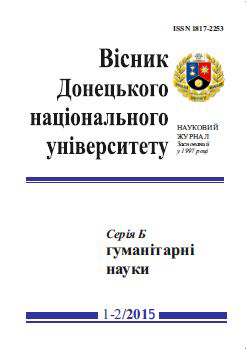Paradigmatic medieval city – between transcendent purpose and earthly pragmatics.
Keywords:
civitas, exegesis, Respublica Christianorum, paradigmAbstract
It turns conceptual exegesis, which legalized in the imagined world picture Medieval city phenomenon. In the early Middle Ages, finding a perfect sense of the city based on the opposition of two of his evangelical images. First – Jerusalem, whose image began to take shape under the influence of the texts of the Old Testament, in particular fragment, in which the Lord promises to bless Solomon and be in the temple of Jerusalem (3 v. Samuel 9: 3-5). It's the city became the center of God's presence again – during their stay in it Christ. Finally blesses this city of Revelation, which provides an image of the New Jerusalem – the city will be lowered from heaven. (Rev. 21: 12-27). The second image of the city has many forms of sin. God is the destruction of Sodom and Gomorrah, the accumulation of the damned sinners sample depravity of the human race Babylon. The supposed death of these towns, for the early Christians, was a living example of God's wrath, worthlessness and hopelessness of mankind. From this it followed that, as a social phenomenon, the sinful city community of people that does not require the formation of his secular and sacred statements in the ranks of the universe, if there is no God and the Christian consent. It is noted that the city has established itself in the Middle Ages in the outlook of this era as one of the ideal spaces realization Respublica Christianorum, as the embodiment of transcendental sense of being compatible Christians as a common contract that protects a person from the threat of the sinful world and gives him the opportunity to improve. Such a notion has been legalized through the doctrine avgustianskoy civitas permixta, which merged with the interpretation of the ideas of the ancient sivitas. The medieval town, as well as antique policy, is "an organized community of people", which is designed to protect against the volatility of time and ensure the immortality of the soul, which is achieved by the collective orientation of citizens to the celestial images. Such a submission should be embodied in all earthly things (the masterpieces of craftsmen), actions (political activity – the achievement of a just peace, perfect self, virtue), spiritual and rational life of citizens (the construction of temples, the general practice of prayer, the content of universities and hospitals), and in this citizen is free to realize themselves, affirmed in his space. The highest aspirations of citizens were sent to a mountain goal – joining the general speculative integrity of the universe, producing hierarchical rank, which is realized through a virtuous life form. Also, the synthesis of images of the ancient and medieval city policy was intended to establish a new social and political order – just peace and harmony of all social elements in the city, the freedom of citizens. Civitas permixt doctrine to confront the imperial idea, which does not leave the individual associations and freedom of choice, an opportunity to improve and serve the transcendent. Formation of the medieval city was both spiritual and pragmatic problem-terrestrial who embodied "earthly means" and claimed a distinctive feature of the medieval city, which houses the transcendental desire of Christianity and worldly, the natural desire of people to live in peaceful harmony.References
Августин Блаженный. О граде Божием / Блаженный Августин. – Мн. : Харвест, М. : АСТ, 2000. – 1296 с.
Святой Аврелий Августин. Слово о разорении города Рима / Августин Аврелий. Пред. и перев. с латин. С.А. Степанцова // Вестник древней истории. – 2001. – № 2. – С. 245-250.
Барг М.А. Эпохи и идеи. Становление историзма / А.М. Барг. – М. : Мысль, 1987. – 348 с.
Аверинцев С.С. Поэтика ранневизантийской литературы / С.С. Аверинцев. – М. : «Наука», 1977. – 320 с.
Кнабе Г.С. Древний Рим – история и повседневность: очерки / Г.С. Кнабе. – М. : Искусство, 1986. – 208 с.
Арендт Х. Vita activа, или О деятельной жизни / Ханна Арендт, пер. с нем. и англ. В.В. Бибихина; под ред. Д. М. Носова – СПб. : Алетея, 2000. – 437 с.
Уколова В.И. Город как парадигма средневековой культуры / В.И. Уколова // Средние века. Вып. 61. – М. : Наука, 2000. – С. 154-168.

